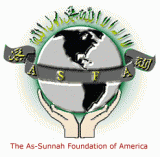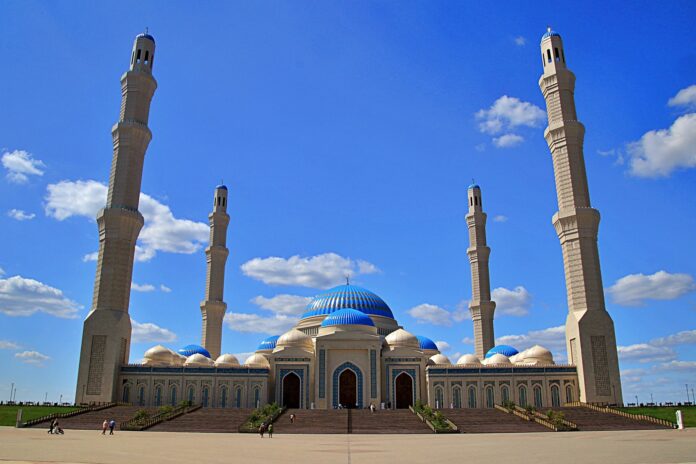He was from the people of Samarqand and authored the tarikh of Samarqand, Al-Mulaqqab bil Qand. He composed al-Jami’ As-Saghir into poetry. He was an expert in many sciences, he authored over a hundred books on the subjects of hadith, Tafsir, and Shurut. He narrated from Ismail bin Muhammed al-Nuhi, Al-Hasan bin Abdil Malik al-Qadi, Mehdi bin Muhammed al-‘Alawi, Abdullah bin Ali bin ‘Isa an-Nasafi, Abi al-Yusr Muhammed bin Muhammed al-Nasafi, Husayn al-Kashghari, Abi Muhammed al-Hasan bin Ahmed as-Samarqandi, and Ali bin al-Hasan al-Maturidi. Muhammed bin Ibrahim at-Tawrishti, his son Abu al-Layth Ahmed bin Umar and others narrated from him.” (Siyar ‘Alam An-Nubula-Imam Al-Zhahabi)
His Meeting with Allāma Zamakhshari (Scholar of Arabic Grammar)
When he went to his house, and knocked on Allama’s door in Makka, Allāma said, “who’s knocking”, Abu Hafs said, “Umar”, Allama said, “Insarif (go away)” Abu Hafs replied, “Umar La Yansarif (will not go away), Allama replied, “idha nakira yansarif (if he’s not known (common noun) then he should leave).”
As-Sam’ani said, “Imam Nasafi was an outstanding jurist, a master in the hanafi school and in Arabic Literature. He wrote many books on fiqh, hadith. He composed the book Al-Jami’ As-Saghir into poetry”, and made mistakes in some of his hadith works.
“Ibn An-Najjar said about him, “He was an excellent jurist, an exegist, a Muhaddith, Adeeb, a Mufti, and he authored books on Tafsir, hadith, and Shurut.”
He was the Shaykh of Allama Marghinani (author of al-Hidaya).
Allama Marghinani said, “I heard Najmuddin say, I narrate ahadith from 550 shuyukhs.”
(Al-Jawhar al-Madiah fi Tabaqat al-Hanafiya by Shaykh Abdul-Qadir Al-Qurashi al-Hanafi)
“Allama Abu Hafs was born in Nasf, in the year 461 Hijri, he is Umar bin Muhammed bin Ahmed bin Ismail bin Muhammed bin Ali bin Luqman. His kunya is Abu Hafs, Laqab is Najmuddin Din, he’s known as Nasafi or Samarqandi.
His Travels while Seeking Knowledge
Najmuddin Din sought knowledge from beyond Ma wara an Nahr, and fromparts of Iraq, and Hijaz. And when he visited Mecca he met with Allama Zamakhshari, and the incident is mentioned above. He had thousands of students who came to seek knowledge from him, and his own teachers would seek his advice in matters. He passed away in 12 of Jamadul Ula 537 in Samarqand.
Some of His Authored Book and Works
He has over 100 books; some of them have been lost. Mawlana Imtiyaz Ali Urshi Rampuri gives the names of the following books of Abu Hafs in his research:
Tafsir (Exegisis) and Qira’at (Qur’anic Recitation):
-
- At-Taysir fi At-Tafsir-Tafsir – Four volumes Tafsir in Arabic, the fourth volume is present in the library of Ridaiya in Rampur.
-
- Imam Nasafi (Rehmatullah Alaih) writes in his Tafsir al Nasafi:
-
- قَالَ ٱلَّذِينَ غَلَبُوا۴ عَلَىٰۤ أَمْرِهِمْ} من المسلمين وملكهم
وكانوا أولى بهم وبالبناء عليهم {لَنَتَّخِذَنَّ عَلَيْهِم} على باب الكهف {مَّسْجِدًا} يصلي فيه المسلمون ويتبركون
-
- Translation: {Those who prevailed over their affair} these are the “Muslims and the rulers” who said to build over them i.e. on the door of cave a Masjid so that “Muslims can pray in it and seek blessings (
tabarruk
- ).” [Tafsir al Nasafi, Volume No.3, Page No. 18]
- Al-Akmal Wa Al-Atwal Fi At-Tafsir- another Tafsir written by him.
- Risala fi al-Khata’a (mistakes) Fi qiratil Quran (printed).
Hadith (Traditions of the Holy Prophet Muhammad (pbuh):
- Kitab ul Yawaqiit fi al-Mawaqiit – Ahadith on the merits of different times (Waqt).
- Tatwiil ul Asfar Li-Tahsiil al Akhbar.
Fiqh (Islamic Jurisprudence):
- Al-Manthuuma fi al-Fiqh – The book Al-Jami’ As-Saghir by Imam Muhammed bin Hasan As-Shaybani composed into poetry.
- Al-Manthuma an-Nasafiya fi al-Khilafiyaat.
- Kitabul Masarih fi al-Fiqh
- Kitab ad-Da’ir fi al-Fiqh
- Kitab Tilabtul Talaba
- Qaydul Awabid lima fihi min ta’ liiful Shawarid
- Al-Khisal fi al-Masa’il
Tasawwuf and Akhlaq (Ascetism and Manners):
- Risala fi Bayani Madhahib al-Mutasawwifa
- al-Munbihaat – In Manuscript
- Tarikh wa tadhkira (History and Biographies):
- Ta’dad as-Shuyukh li Umar – Biographies of the scholars of hadith whom Abu Hafs studies under.
- Kitab ul Kind bi Ma’rifati Ulema’ Samarqand
- Tarikh Bukhara
Adab (Arabic Literature):
- Al-Ash’aar bi al-Mukhtar min al-Ash’aar – 10 Volumes
- Ujalatul Nakhshabi li Dayfil Maghrabi
Da’iratul Ma’arif (Encyclopedia):
- Matla’in Nujum wa Majma’ul Uloom – Encyclopedic work on different sciences, its manuscript is found in the library mentioned in number 1.
A’qaid (Islamic Articles of Belief):
- A`qaid An-Nasafi (Kitab ul Tawhid wal ‘Aqaid)
Many commentaries have been written on this work of his, some of them are commentaries and others are notes (Hashiyah). Here are some: - Sharh A’qaid An-Nasafi – Sa’d ud Din Taftazani (d. 793 Hijri)
- Hashiya al-Khayali ‘ala Sharh ‘Aqaid – Shaykh Ahmed bin Musa Khayali
- Al-Fawaid an-Nasafiya – A Hashiya on Taftazani’s Sharh by al-‘Isam (d. 951 Hijri)
- Hashiya Bahishti – A Hashiya on the Khayali’s Hashiya by Shaykh Ramadan Ali’.
- Hashiya Siyalkoti – Hashiya on Khayali’s Hashiya written by Abdul Hakim Siyalkoti (d. 1047 Hijri), and known as Maulwi Khayali.
- Hashiya ‘ala Hashiya Siyalkoti – Hashiya Siyalkoti’s Hashiya by Siyalkoti’s student Diya’ ud Din Khalid al-Baghdadi.
- Hashiya al-Iskandari – Hashiya on the Khayali’s Hashiya written by Abu AbdulAllah al-Iskandari (d. 1300 Hijri).
- Hashiya Muslih ud Din – Hashiya on Khayali’s Hashiya.
- Hashiya Maulwi Khadim Husayn Adhim Aabadi.”
- (Tadhkira Musannifin Darsi Nizami by Akhtar Rahi)
“Umar bin Muhammed bin Ahmed bin Ismail bin Muhammed bin Luqman An-Nasafi then As-Samarqandi. Ibn As-Sam’ani said, “He was an outstanding Imam surpassing others, an Expert in one’s field (Mutafannin). He authored many books on different sciences, from them Tafsir, hadith, Shurut. His works reached 100, and he wrote excellent poetry. And he wrote Al-Jami’ As-Saghir of Muhammed bin al-Hasan into poetry, and he’s the author of Al-Qand fi dhikr Ulema Samarqand.” He was born in the year 461 and passed away in the 12th of Jamadul Ula, year 537.
(Tabaqat ul Mufassirin by Allama’ Suyuti)
Allama’ Zarkali in is A’alaam mentions similar to what is written in the above works.
Allama Ibn Qutlubagha in his Taj at-Tarajim Fi Tabaqat al-Hanafiya says mostly what Shaykh al-Qurashi said, and mentioned Kitab ul Qand which is a biographical dictionary of the scholars of Samarqand.
-
- “It is said that the used to teach both humans and jinns, for this reason he was called Mufti at-Thaqalyn. From his works: al-Manthuma – the first fiqh book composed in poetry form, Mashari’ al-Shara’i, Tarikh Bukhara, Al-Fatawa al-Nasafiya, Kitab al-nijah fi Sharh Kitab Akhbar as-Sihah.
-
- Someone saw him in a dream after his death and asked him (Abu Hafs) how did the questioning with Munkar and Nakir go? He (Abu Hafs) said, “Allah (exalted is He) returned by soul and Munkar and Nakir questioned me. I said, “Should I answer it in prose or poetry?” they said, “poetry”. So I said,
-
- ربي الله لا اله سواه ونبي محمد مصطفاه
-
- وديني الإسلام و فعلي ذميم اسأل الله عفوه و عطاه
-
- My Lord is Allah (exalted is He) there is no God besides him and my Prophet is Muhammed, His chosen one
-
- My religion is Islam and my works are blameworthy I ask Allah (exalted is He) (for) His pardon and gift. (Jannah)
His poetry is also in the book by Allama Zarnuji, Ta’lim al-Muta’allim.
Some more commentaries on al-Aqaid an-Nasafiya:
-
-
- Sharh ul Aqaid – Shamud Din Abu At-Thana Muhammed bin Ahmed Isfahani (d 749)
- Al-Qalaid ‘ala al-‘Aqaid – Shaykh Jamal ud Din Mehmoud bin Ahmed bin Masoud Qunuwi (d 770).
- Al-Qawl al-Wani Sharh ‘Aqaid an-Nasafi – Shamud Din Abu ‘Abdullah Muhammed bin ZaynudDin Qasim.
- Hal al-Ma’aqid Fi Sharh al-‘Aqaid – Shaykh Mulla Zadah Hirawi Khayr Ziyani
- Al-Fawaid al-Qadirya Fi Sharh al-Aqaid An-Nasafiya – Abdul Qadir nib Abu Nasr Muhammed Idris bin Muhammed Mehmoud Sulhati.”
-
(Halaat-e-Musannifin Darsi Nizaami)
Mawlana Muhammed Hanif Gongohi mentions thirty two Hawashis. “He was an excellent Imam, an Usuli, Mutakallim, Mufassir, Muhaddith, Faqih, Hafidh, Nahawi, Lughawi, bright and intelligent.”
(Tabaqat al-Mufassirin Ahmed bin Muhammed Al-Adnarwi)
[from https://ilmandulama.wordpress.com/book-review/biography-of-imam-an-nasafi/]



